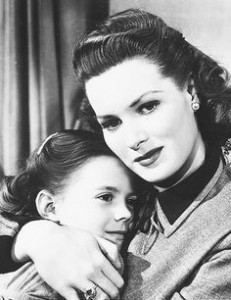 Christmas just wouldn’t seem like Christmas without “Miracle on 34th Street.” As soon as I flip the calendar over to December, I schedule a date with myself to change into pajamas as soon as it gets dark and settle down in front of the TV for an hour and a half of nostalgic delight.
Christmas just wouldn’t seem like Christmas without “Miracle on 34th Street.” As soon as I flip the calendar over to December, I schedule a date with myself to change into pajamas as soon as it gets dark and settle down in front of the TV for an hour and a half of nostalgic delight.
This year, though, I watched “Miracle” with an added sense of poignancy. Maureen O’Hara, who portrayed liberated women in the movies decades before that term came into being, died in October at age 95. I’ve admired her in every role she played, but Doris Walker is my hands-down favorite. In an era when women had limited career choices, Doris held an executive position at Macy’s. What job could be more demanding—or important–than being personnel director AND in charge of the Thanksgiving Day Parade, especially when Santa Claus shows up intoxicated?
Unless it’s her job as self-sufficient single mom to seven-year-old Susan, who attends a “progressive school” and doesn’t engage in such childish behavior as pretending to be a zoo animal or believing in Santa Claus.
We learn early on that Doris divorced Mr. Walker when Susan was just a baby and that Susan never knew him. (No mention is ever made as to whether he pays child support but I’m betting not.) Doris isn’t merely a realist. She’s a skeptic and a cynic. When handsome neighbor-across-the-hall Fred Gailey, who wants desperately to court her, kindly points out that she’s passing those traits along to her young daughter, Doris doesn’t mince words in defending herself.
“When a child’s head is filled with fairy tales, she grows up seeing life as fantasy rather than reality,” she tells him. “That child will keep waiting for Prince Charming to come along and when he turns out to be…” She doesn’t finish the sentence. She doesn’t need to. The audience suddenly understands what makes Doris Walker tick.
Now it’s up to Fred Gailey and Kris Kringle to change her mind.
They do, of course. Doris hires Kris to play Santa Claus at Macy’s, which gives him ample opportunity to demonstrate the real spirit of Christmas. He tells harried parents where to buy toys their children really want, not just the ones Macy’s sells. He speaks to a little Dutch girl in Dutch. He moves in with Fred so he won’t have to travel so far to work and becomes fast friends with Susan.
Who still doesn’t believe he’s Santa Claus. Or that there is a Santa Claus.
You know the rest of the story. Thanks to the United States Post Office and Fred’s clever courtroom shenanigans, a judge declares Kris Kringle to be the one and only true Santa. Susan is softening, thanks in part to her mother telling her that “faith is believing in something even when common sense tells you not to.” But she won’t be convinced unless Santa comes through with the only thing she really wants for Christmas—a bungalow on Long Island.
In one of the best “last scenes” Hollywood ever created, Fred and Doris and Susan happen upon the very bungalow Susan clipped out of the want ads, complete with a FOR SALE sign in the yard. Leaning in the corner of the living room is Kris’s cane. And we know for certain that this threesome will form a family and live happily ever after, with all skepticism and cynicism gone.
But there’s something else I’ve always believed, though it’s not mentioned in the movie. Doris doesn’t quit her job at Macy’s to become a suburban housewife. She is, after all, a liberated woman light years ahead of her time.
(December 27, 2015)